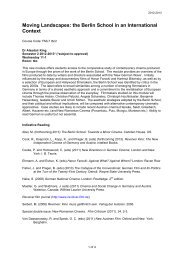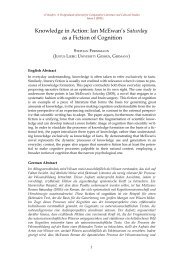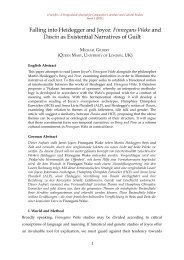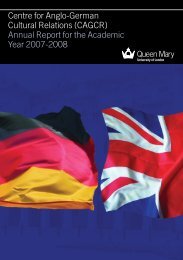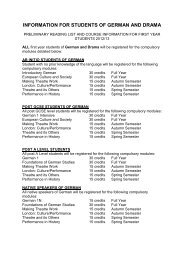Student Handbook - The School of Language, Linguistics and Film
Student Handbook - The School of Language, Linguistics and Film
Student Handbook - The School of Language, Linguistics and Film
Create successful ePaper yourself
Turn your PDF publications into a flip-book with our unique Google optimized e-Paper software.
In addition, there are occasional special lectures, by distinguished visiting speakers. In<br />
particular the department organizes two annual lectures: the History <strong>of</strong> the Spanish <strong>The</strong>atre<br />
Lecture <strong>and</strong> the Kate Elder Lecture. <strong>The</strong>se lectures take place in the evening <strong>and</strong> are<br />
usually followed by a reception. <strong>The</strong>y are a great opportunity for students in all years to feel<br />
part <strong>of</strong> the academic community <strong>of</strong> the department.<br />
17.5 DEPARTMENT OF LINGUISTICS<br />
Libraries in London<br />
Queen Mary has good library holdings in <strong>Linguistics</strong> but you can also find linguistics books<br />
<strong>and</strong> journals in the University <strong>of</strong> London library at Senate House. Birkbeck <strong>and</strong> UCL libraries<br />
also have excellent collections which you can use for reference if you show your Queen<br />
Mary ID card.<br />
Research seminars<br />
<strong>The</strong> <strong>Linguistics</strong> Research Seminar meets 3 or 4 times each semester. <strong>The</strong>se sessions are<br />
primarily designed for research students <strong>and</strong> staff, but the subjects discussed are <strong>of</strong>ten<br />
interesting for undergraduate students, <strong>and</strong> relevant to undergraduate modules. You are<br />
very welcome to attend. Look out for emails advertising specific seminars, <strong>and</strong> check the<br />
<strong>School</strong> website for the programme for the year. You can find out about other research<br />
seminars <strong>and</strong> <strong>Linguistics</strong> events in London on www.londonling.ucl.ac.uk/events.htm<br />
Other <strong>Linguistics</strong> Facilities<br />
<strong>The</strong> <strong>Linguistics</strong> Lab <strong>and</strong> the <strong>Linguistics</strong> Recording Studio are primarily for the purposes <strong>of</strong><br />
research; however, they may be used by students undertaking a research project if<br />
approved by the chair <strong>of</strong> the <strong>Linguistics</strong> Department.<br />
17.6 DEPARTMENT OF RUSSIAN<br />
Libraries<br />
Queen Mary library has very good Russian holdings. We shall be very happy to get anyone<br />
reading rights in SSEES (16 Taviton Street, tel. 020 7679 8701). Anyone who does not take<br />
modules at SSEES can use the library for reference only. You will have to show your<br />
University <strong>of</strong> London ID <strong>and</strong> have a letter <strong>of</strong> commendation from the department. To borrow<br />
books you will need to pay an annual fee. Everyone who is registered for a module at<br />
SSEES will automatically obtain a library ticket <strong>and</strong> will not need to pay any fee.<br />
Visiting Lecturers<br />
We are particularly fortunate in having regular teaching assistance <strong>and</strong> a stream <strong>of</strong> eminent<br />
academic visitors from Russia. This is an extraordinary opportunity for you to enhance your<br />
Russian skills, both aural <strong>and</strong> oral. <strong>The</strong> seminars cover a variety <strong>of</strong> topics ranging from<br />
Russian literature <strong>and</strong> cultural history to translation techniques. Material covered in these<br />
seminars will be included in the exams <strong>of</strong> the relevant modules. Eligibility for summer<br />
vacation grants is conditional upon active participation in classes taught by visiting lecturers.<br />
Study abroad<br />
We very much hope that you will be able to spend at least three months in Russia at some<br />
time during your studies, quite apart from time you may spend there during vacations.<br />
Neither a three-month nor a five-month period abroad will add a year to your module, unless<br />
you combine it with up to six months in a country where your other language is used.<br />
Where only a part <strong>of</strong> an academic year is spent in Russia, special arrangements have to be<br />
made for seeing you through your modules. If you are away in the second half <strong>of</strong> the year,<br />
you may be assessed on the essays written in the first half <strong>of</strong> the year since you are likely to<br />
miss the examinations; if the other way round, you will need to do serious work while away,<br />
68



